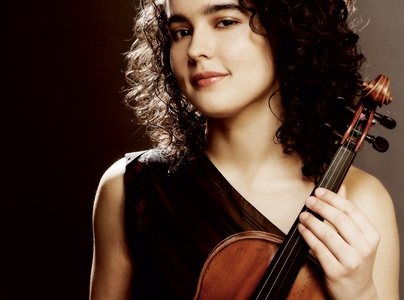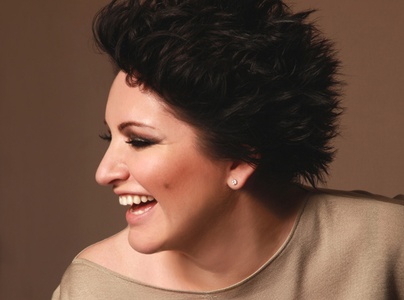Гала-концерт IV Международного фестиваля «Приношение Кнушевицкому»
May 29, 2013
Tchaikovsky Concert Hall
directions to the hallИсполнители:
Хибла Герзмава (сопрано)
Александр Гиндин (фортепиано)
Алена Баева (скрипка)
Евгений Румянцев (виолончель)
Сергей
Суворов (виолончель)
Московский камерный оркестр Musica Viva
Дирижёр – Александр Рудин
В программе:
В.А.Моцарт, Й.Гайдн, К.Й.Липинский:
вокальные и инструментальные сочинения, редко исполняемые в России
А.КУРБАТОВ
Концерт для двух виолончелей и оркестра /Мировая премьера/
Musica Viva Chamber Orchestra
Musica Viva's origins go back to 1978, when violinist and conductor Viktor Kornachev founded a musical ensemble of nine players – all young and enthusiastic, and recent graduates of Moscow's musical academies. By 1988 the ensemble had grown into a full-fledged orchestra, now led Alexander Rudin who also gave the group its name, Musica Viva. Under his guidance, the orchestra achieved the pinnacles of artistic endeavour, and ranked along Russia's finest orchestras.
Musica Viva today is an all-round musical ensemble which performs the widest possible range of compositions in all styles and genres with an assured confidence. The highlight of the orchestra's projects has been the cycle named Masterpieces & Premieres at the Moscow Philharmonic Society, featuring musical masterworks in their original splendour alongside musical rarities which are brought once more back to the concert platform. 2011 marked the creation of the Silver Classics series consisting of works that are not part of the so called ‘golden repertoire’ while deserving indeed to be there. The series includes a Young Artists Programme introducing prize-winners of European music competitions to the audience, as well as annual Cello Assemblies to which maestro Rudin invites his fellow cellists.
The performance of neglected masterworks forms a major part of the orchestra's repertoire. Musica Viva has given the first Russian performances of works by C. F. E. Bach, Cimarosa, Dittersdorf, Dussek, Pleyel, Tricklir, Volkmann, Kozlovsky, Fomin, Vielgorsky, Alyabyev, Degtyarev, and many others. The orchestra also makes the audience discover leading contemporary works, with world and Russian premieres of music by Artyomov, Pärt, A. Sallinen, Silvestrov, Manotskov, Akhunov, Andrei Golovin, and other composers.
Over the last decade, Musica Viva has been increasingly involved in large-scale projects including concert performances of operas and oratorios. Under the baton of Alexander Rudin, the orchestra has performed Haydn’s The Creation and The Seasons; Mozart's Idomeneo, Weber's Oberon, Beethoven's Fidelio, Schumann's Requiem, Vivaldi's Juditha Triumphans, and Degtyarev's Minin & Pozharsky, or Liberation of Moscow. The musicians presented the Russian premieres of Handel's cantata Apollo e Daphne and operatic serenata Aci. Galatea e Polifemo, and of Hasse's serenata Marc Antonio e Cleopatra and oratorio I Pellegrini al Sepolcro di Nostro Signore. In collaboration with the British maestro Christopher Moulds the orchestra has given the Russian premieres of Handel's operas Orlando and Ariodante, as well as his oratorio Hercules.
Musica Viva regularly invites musicians of world status to join its performances. These have included Christopher Hogwood, Sir Roger Norrington, Vladimir Jurowsky, Andraš Adorian. Robert Levin, Andreas Staier, Eliso Virsaladze, Natalya Gutman, Ivan Monighetti, Nikolai Lugansky, Boris Berezovsky, Alexei Lubimov, Giuliano Carmingola, Isabelle Faust, Roel Dieltiens, Thomas Zettmaier, Christian Tetzlaff , Shlomo Mintz, and leading operatic prima donnas Joyce di Donato, Annick Massis, Vivica Genaux. Deborah York, Susan Graham, Malena Ernman, Stéphanie d’Oustrac, Hibla Gerzmava, and Julia Lezhneva. World-famous choirs including Collegium Vocale Gent and Latvia, as well as the Russian vocal ensemble Intrada, have also appeared with the orchestra.
Musica Viva makes continuous appearances at major international music festivals including world-renowned La folle journee taking place in France, Spain, Japan, Poland, and Russia (Yekaterinburg). The orchestra has toured to Germany, France, the Netherlands, Italy, Spain, Belgium, Japan, Czechia, Slovenia, Poland, Finland, Turkey, India, and Taiwan, while giving regular concerts in many Russian cities.
The orchestra has recorded over 20 albums for such labels as Russky Sezon, Olympia, Hyperion, Naxos, Chandos, Тudor, Fuga Libera, and Melodiya, among others. Symphonies by Johann Stamitz were released in 2019, while Beethoven's Triple and Violin Concertos with Dmitry Sinkovsky (violin), Alexei Lyubimov (historical piano) and Alexander Rudin (cello, conductor) appeared in 2020. Recordings with maestro Rudin as a soloist are of particular interest and include cello concerts by Tricklir, Myaskovsky, Antonin Kraft, and baroque composers, such as Hasse, C. P. E. Bach, Hertel etc. The Grieg Album introduces Alexander Rudin a master of orchestration, featuring his orchestral versions of chamber works by the Norwegian composer.
In the 2028/19 season, Musica Viva celebrated its 40th anniversary. Over many years, the orchestra’s activity has been supported by a grant of the Russian President.
Alexander Rudin
Alexander Rudin is an internationally acclaimed cellist, conductor, pianist, harpsichordist, professor at the Moscow Conservatoire, researcher of early scores, author of orchestral versions of chamber works and the mastermind behind unique themed series. The musician’s repertoire includes cello music from four centuries – both pieces that are exceedingly well-known and others that have never been performed before. Thanks to Rudin’s attention to forgotten episodes in the history of music, music-lovers throughout the world have heard many new works for the first time. These include Mikhail Vielgorsky’s Theme and Variations for cello and orchestra, cello concerti by Antonín Kraft, Jean Balthazar Trickler, Johann Heinrich Facius and Robert Volkmann, Dvořák’s First Cello Concerto and original versions of works for cello and orchestra by Tchaikovsky – Variations on a Rococo Theme and Pezzo capriccioso. Much of Rudin’s repertoire features works by contemporary composers including Valentin Silvestrov, Vyacheslav Artyomov, Edison Denisov and Andrei Golovin.
Having received a traditional academic education, Alexander Rudin became interested in the authentic performance of early music, and in time came to a natural synthesis of moth movements. He currently combines performances on a modern cello and a viola da gamba and he performs both music by the Romantic composers and works from the baroque era and early classicism. Rudin’s activities as a pianist and conductor are developing in much a similar manner.Since 1988 the musician has been Artistic Director and Principal Conductor of the Musica Viva Moscow chamber orchestra. Together with the ensemble, in Moscow he has presented unique concert programmes, many of which have been held during the subscription series Masterpieces and Premieres and Musical Gatherings at the Tretyakovs’ House, subscription series at the Moscow International House of Music and the Russian Gnessin Academy of Music and the Dedication festival. Since 2022, Alexander Rudin has been Artistic Director and Chief Conductor of the Russian National Orchestra.
The conductor has earned a reputation as a brilliant interpreter of opera scores and major works in the cantata and oratorio genre. In Moscow, he has conducted the Russian premieres of the oratorio Juditha triumphans by Vivaldi and an original version of Degtyarev’s oratorio Minin and Pozharsky, or the Liberation of Moscow. There have been performances of Haydn’s oratorios The Creation and The Seasons, Mendelssohn’s Symphony No. 2 (Hymn of Praise) and concert versions of the operas Idomeneo by Mozart and Oberon by Weber.As a guest conductor, Alexander Rudin appears with numerous acclaimed orchestras including Academic Symphony Orchestra of the St Petersburg Philharmonic (Honoured Ensemble of Russia), Tchaikovsky Symphony Orchestra, Svetlanov Symphony Orchestra and symphony and chamber orchestras in Norway, Finland and Turkey.
Alexander Rudin frequently appears on tour. As a soloist and conductor he has taken part in the international festivals Les Pianos folies (France) and La Follе Journée (France, Spain, Japan) among others. Rudin performs recitals in such countries as Germany, Finland, The Netherlands, Canada, Great Britain, Hungary, Slovenia and Turkey. The musician’s activities as a teacher are linked with the Moscow Conservatoire (where he teaches a chamber ensemble class) and one of Turkey’s most prestigious higher education institutions – Yaşar University in Izmir. The performer gives master-classes around the world and collaborates with Youth Orchestras as a conductor.
Alexander Rudin’s discography includes over thirty discs released on leading Russian and international labels (Naxos, Olympia, Tudor, Melodiya, Cello Classics, Russian Season, Russian Disc, RCD). Particularly well received were his recordings of six suites by Bach (Naxos), cello concerti by Trickler, Myaskovsky’s Cello Concerto, a Grieg Album, works by Alexander Alyabiev and Alexander Cherepnin as well as a live recording of a concert from the Great Hall of the Conservatoire (Beethoven’s Third Symphony and Kraft’s (Cello Concerto).In 1983 Alexander Rudin graduated from the State Gnessin Musical Education Institute (cello class of Lev Yevgrafov and piano class of Yuri Ponizovkin). In 1989 he completed his studies at the Moscow State Conservatoire (conducting class of Dmitri Kitaenko). While still a student he was a prize-winner at the prestigious Bach Competition in Leipzig (1976), the Cassado Competition in Florence (1979) and the Tchaikovsky Competition in Moscow (1978, 1982).
Alexander Rudin is a People’s Artist of Russia, a recipient of the State Prize of Russia and a recipient of the City of Moscow Government Prize.
Hibla Gerzmava
Hibla Gerzmava graduated from the vocal department of the Moscow conservatory in 1994, and finished her postgraduate course there in 1996. Since 1995 she has been the soloist of the Stanislavsky and Nemirovich-Danchenko musical theatre in Moscow. Her name has been famous since 1994, when she won the Grand Prix at the Tchaikovsky International Competition, the first and only time in the competition’s history that the highest prize has been awarded to a women vocalist.
She is highly sought-after guest soloist at leading opera houses worldwide, including the Mariinsky Theatre, Covent Garden, Metropolitan Opera, Bavarian State Opera, Teatro La Scala and opera houses in Vienna, Paris and Rome, Zürich, Madrid etc. She has performed with such outstanding musicians and conductors as Lorin Maazel, Antonio Pappano, Marco Armiliato, Adam Fischer, Jiří Belohlávek, Fabio Luisi,Vladimir Spivakov, Valery Gergiev, Alexander Rudin, Vladimir Fedoseyev, and many others.
In 2010, her performance of Lucia in Donizetti’s Lucia di Lammermoor brought her the highest Russian theatrical award – the Golden Mask, as well as Casta Diva Critics Award and the Moscow Government Award for achievement and contribution to the world of arts and culture. In 2016, her performance of Cherubini’s Medea brought her the second award of Golden Mask. In 2021, Hibla Gerzmava was awarded the State Prize of the Russian Federation in literature and arts.
Hibla Gerzmava has appeared with recitals in Sweden, France, Netherlands, Austria, Belgium, Spain, Greece, the USA, Japan and Turkey. In 2002 and 2003, she took part in the Ludwigsburg Festival in Germany where she sang Eva in Die Schöpfung by Haydn and the Angel in the Rappresentatione di anima e di corpo by Emilio de Cavalieri. Hibla Gerzmava is often invited to take part in oratorio concerts. She has sung soprano parts in Mozart’s Requiem, Great Mass in C minor, Coronation Mass, Vesperae solennes de confessore, in Beethoven’s Ninth Symphony and Verdi’s Requiem.
In March 2008, Hibla Gerzmava made her Covent Garden debut as Tatiana in Tchaikovsky’s Eugene Onegin and appeared there again in 2009 as Mimi in Puccini’s La bohème, coming back to the Royal Opera House in January 2012 as Donna Anna in Mozart’s Don Giovanni. She sung the part of Mimi for her debuts at the Bayerische Staatsoper in Munich and at the Teatro dell’Opera di Roma in Rome in 2011. In 2010, Hibla made her Metropolitan Opera debut in the parts of Stella and Antonia in Offenbach’s Les contes d’Hoffmann, and in 2011 she went back there to sing Mimi in Franco Zeffirelli’s production of La bohème.
She made her triumphal debut on the stage of Palais Garnier at the Opéra National de Paris as Vitellia in Willy Decker’s production of Mozart’s La Clemenza di Tito in September-October 2011. She also sung at the BBC Proms Opening Night in July 2011 in Janáček’s Glagolitic Mass conducted by Jiří Bělohlávek and took part in the Mariinsky Theatre’s tour to Japan in February 2011, performing the part of Liù in Puccini’s Turandot at the NHK Hall in Tokyo.
In the season 2019/20 Hibla made her world tour with the recital program include masterworks for voice and piano Russian romances and famous classical Italian Arias. She performed in St.Petersburg, Moscow, Paris, London, New York, Toronto, Tel-Aviv. In 2020 Hibla Gerzmava performed in Vienna State Opera as Amelia Grimaldi alongside Placido Domingo as Simon Boccanegra in Verdi's Simon Boccanegra. In 2021 she made her debut as Norma at Madrid Royal Theater, and also debuted at Arena di Verona in Verdi’s Requiem.
Besides a busy operatic career, Hibla developed a unique project of her own – a crossover concert program Opera & Jazz where she brings together classical singing styles with jazz improvisation, performing original and highly distinctive interpretations of music by a wide range of composers including Handel, Mozart, Puccini, Verdi, Donizetti and Gershwin. A national artist of both the Russian Federation and the Republic of Abkhazia, Hibla is a unique phenomenon on the Russian opera stage.






